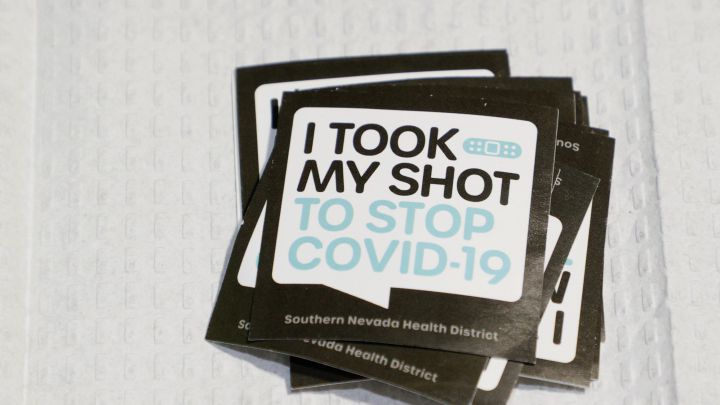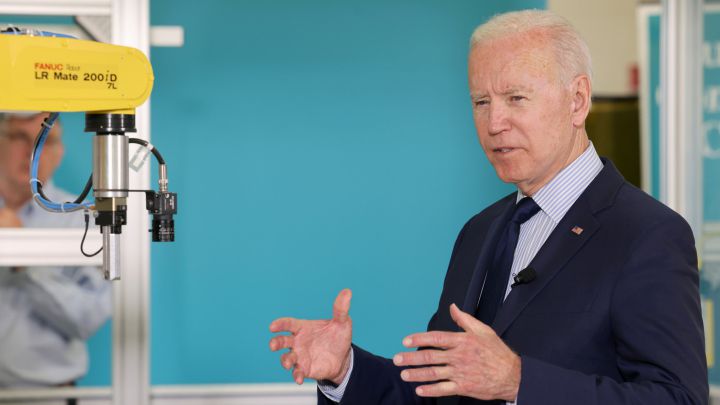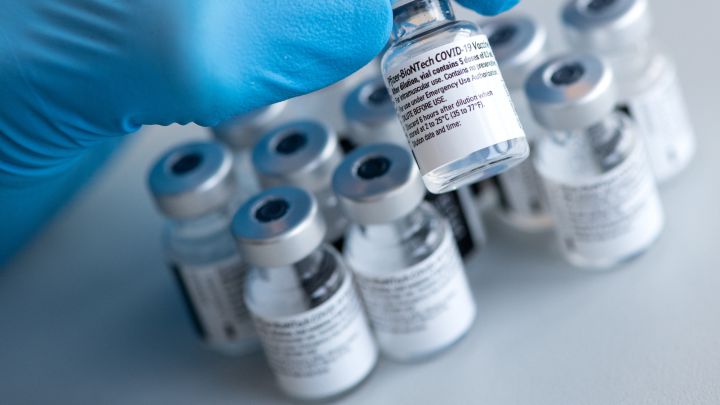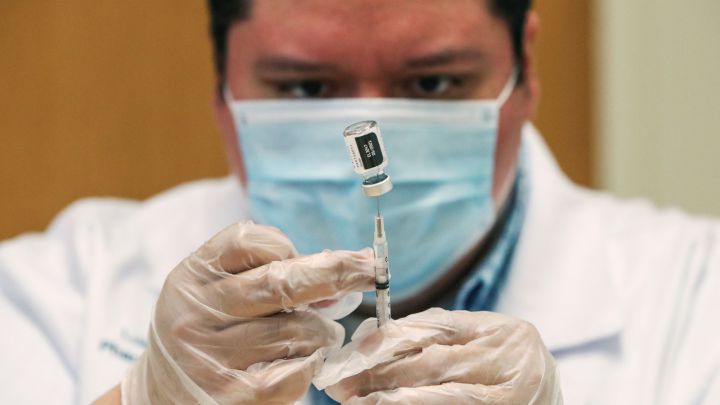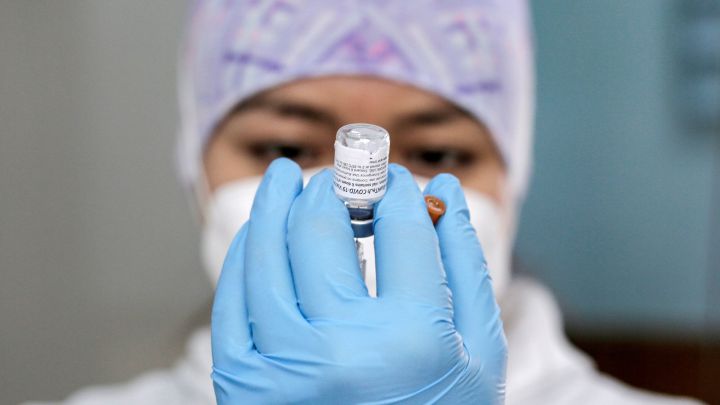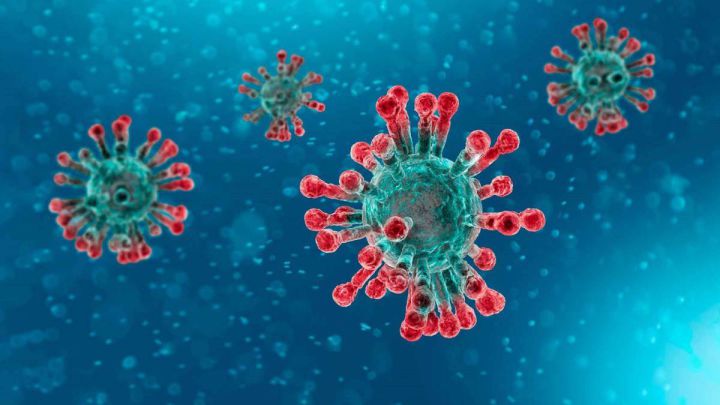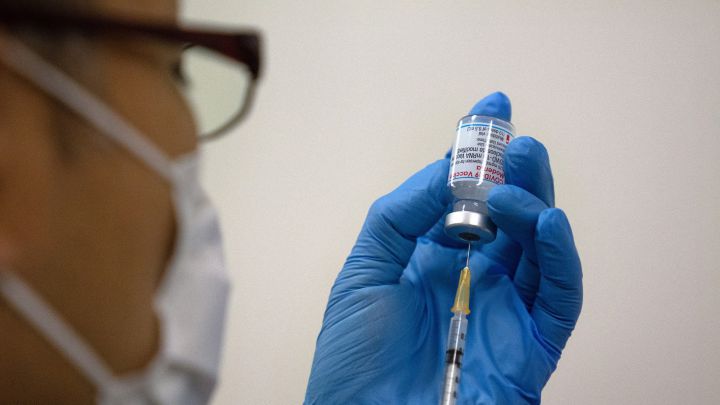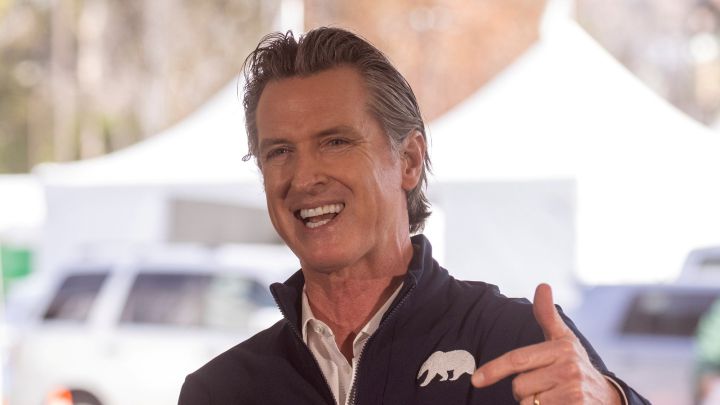Covid-19 vaccine in the US | news summary for Tuesday 1 June
Keep up to date with the latest US vaccine news and global developments, as the US surpasses the milestone of having 50% of the adult population vaccinated.
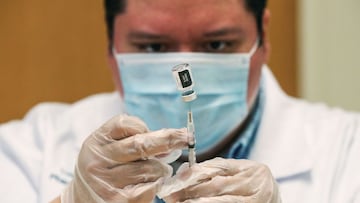
Show key events only
US vaccine latest news live: Tuesday 01 June 2021
Headlines
- Can my employer ask for my vaccine card? (Full details)
- Patent waiver talks stall at WTO
- WHO grants China's Sinovac emergency authorization
- Germany lowers covid-19 risk level for first time in 2021
- Buttigieg responds to plane mask complaints as air travel takes off
- Japan confident Olympic Games will go ahead
- Florida face-off over vaccine passports
- North Korea COVAX vaccine delivery delayed
- India in talks over Sputnik Light vaccine
- Single-dose covid Janssen vaccine approved in the UK
- Dr Fauci points to likely need for booster shots
- 50% of US adults now fully vaccinated, as Biden calls the milestone "a big deal"
- Moderna claims vaccine 'strongly' protects against virus in 12 to 17 year olds
- CureVac vaccine approval expected in June
- Pfizer and BioNTech pledge to give one billion doses to low- and middle-income countries by end of year
- California won’t create vaccine passport, but large events may require vaccine/test proof
- US vaccine roll-out to children aged 12-15
- Over 135 million US citizens now fully vaccinated (track CDC data here)
- US covid-19: 33.27 million cases / 594,853 deaths (live updates from JHU)
Scroll through some of our related articles:
$10M New Mexico Vaccine Lottery: how to enter and sign up
How many other states have implemented vaccine lotteries?
Nine states, including New Mexico which just announced theirs today, have established covid-19 lotteries.
California
California’s vaccine lottery is the largest to be announced and will give away $1.5 million to ten Californians who have received at least one dose of a covid-19 vaccine.
Colorado
On 25 Colorado Governor Jared Polis unveiled the “Colorado Comeback Cash Vaccine Drawing” which will select five vaccinated residents to win $1 million.
Since the contest has been announced the percent of residents who have received at least one dose of a covid-19 vaccine increased one point to 45.4%.
Delaware
On 25 May, Governor John Carney introduced “ DE Wins!,” which described as “a public education and incentive program aimed at increasing COVID-19 vaccination rates in Delaware.”
All individuals above the age of twelve, who have been vaccinated “will be entered to win $5,000 in cash and additional prizes in twice-weekly drawings conducted by the Delaware Lottery.” On 30 June, two residents that have received a vaccine will be eligible to win the $302,000 grand prize.
Maryland
On 20 May, Maryland Governor Larry Hogan announced the $2 Million VaxCash Promotion which gives those vaccinated in the state a chance to win $40,000.
On 4 July, one person will be selected to win the $400,000 grand prize.
Ohio
Ohio was the first state to announce a vaccine lottery for both young people and adults. The first of five drawings to select a $1 million winner was held on 26 May.
Vaccinated individuals in Ohio now have four more chances to win. The state has announced that the vaccination rate did begin to increase after Governor Mike DeWine announced the contest.
Oregon
On 21 May, Governor Brown of Oregon, introduced the “Take Your Shot” Program. Residents of Oregon have until late June to get vaccinated to have a chance of wining, $10,000 (37 winners) or $1 million (1 winner).
Younger Oregonians could win one of five $100,000 scholarships to an Oregon university or colleges.
West Virginia
On 1 June, West Virginia became one of the latest states to launch a covid-19 vaccine lottery. The state will be giving away cash prizes as well as goods like riffles and trucks.
West Virginia announces a twist on the vaccine lottery, wherein the state will give away prizes that include hunting rifles and trucks to those who have been vaccinated. Cash prizes are also available according to Newsweek. Full details.

May Vaccine Update: One Dose VS Fully Vaccinated
As of May, 62 percent of adults in the US have received at least one dose of a covid-19 vaccine.
The percent of fully vaccinated people stands around 41%, up from the 31% reached in April.
Covid-19 variants given new simplified names
Greek gods? Lost religions? Plants and fruits? The World Health Organization considered various ideas before selecting their replacement naming convention.
Can a vaccinated person spread covid-19?
Despite just over half of the American population having now received at least one dose, the CDC is still unsure how effectively it prevents the spread of covid-19 amongst vaccinated people.
Coronavirus US: What is the minimum age to get vaccinated?
Children aged from 12 years upwards are now eligible for vaccination in all US states according to the Centers for Disease Control and Prevention (CDC).
$50 gift cards and more for vaccinated Californians
Californians are being given $50 gift cards as an incentive to get themselves vaccinated against the coronavirus, in addition to being entered into prize draws that can see them win cash payments of up to $1.5m.
World Bank says US must free up excess covid vaccines for Latin America
The World Bank president said on Tuesday is was vital that the United States frees up excess covid-19 vaccine doses for Latin America as the World Health Organization expressed concern about high infection rates in the region.
Mike Ryan, the top WHO emergency expert, said the situation in the region was "starting to turn in the wrong direction". Four of the top 10 countries for cases last week were there and mortality rates are higher at between 3-5%, he said.
"These next few weeks are vital that in particular the US frees up excess [vaccines] to go to programs that exist," World Bank President David Malpass told the same briefing.
"We're ready to take them tomorrow in the three countries that I mentioned and by two weeks from now in more countries within Latin America," he said, referring to Ecuador, El Salvador and Honduras, which are seeking 220 million vaccine doses.
Latin America's death toll from covid-19 has surpassed one million.
Chile, Peru and Paraguay have reported declines in new infections, but Uruguay, Argentina and Brazil are once again seeing a rise in cases, while Bolivia is reporting a drastic increase in deaths, the Pan American Health Organization said last week.
International Monetary Fund Managing Director Kristalina Georgieva also told the virtual briefing on vaccine equity that vaccine supplies for the region should be prioritised.
"We have to think about where the urgency to act is most significant and unfortunately for Latin America quite a number of countries are hit with the brutal force of covid-19," she said.
US President Joe Biden last month announced pledges of some 80 million vaccine doses, including a significant number that will go to poor countries via the WHO's COVAX sharing programme.
However, Malpass implied that more donations were needed, referring to its policy of vaccinating adolescents who are generally considered of low risk of serious illness.
"One thing needs to be done for the fairness and safety of the whole world: We need to be vaccinating vulnerable people right now," he said.
The WHO has repeatedly called for rich countries to donate shots abroad instead of inoculating children. WHO Senior Adviser Bruce Aylward praised dose pledges by wealthy countries but said the timing for their availability needed to be brought forward.
(Reuters)
Can I take ibuprofen after getting covid-19 vaccine?
The Centers for Disease Control and Prevention (CDC) recommends talking to your doctor about taking over-the-counter medications to relieve any discomfort you may experience after getting vaccinated.

Consider global shortages before giving covid shots to teens, EU body says
European Union countries should take account of global shortages of covid-19 vaccines before rolling out shots for adolescents, the European Centre for Disease prevention and Control (ECDC) said on Tuesday.
Last week, the EU drugs regulator authorised Pfizer and partner BioNTech SE's covid-19 vaccine for children as young as 12. Its previous guidance was for adults aged 16 and above.
The ECDC - echoing World Health Organization (WHO) calls to delay inoculations of young adults in rich nations - said in a report that vaccinating adolescents should be a priority only when they are at high risk of developing serious coronavirus symptoms.
The ECDC has an advisory role within Europe on vaccine rollouts, which are run by national governments.
Studies show most under-20s who catch covid-19 have only mild symptoms, but risks increase among those with underlying conditions such as neurological and pulmonary diseases, the ECDC said.
When deciding whether vaccinating low-risk teenagers, "the wider context of a global vaccine supply shortage should also be taken into account," the ECDC said, noting that healthcare workers and the most vulnerable had yet to be vaccinated in many poorer nations.
Nearly half of adults have received at least a first dose in the EU, and 20% have been fully immunised while, according to WHO data, by mid-May only 1% of vaccines administered globally had been injected in Africa.
COVAX, a mechanism co-led by the WHO to distribute vaccines across the world, has so far shipped less than 80 million shots to more than 120 countries with a combined population of billions, and many of which depend exclusively on COVAX to access shots.
Photo: REUTERS/Kathleen Flynn
WHO approves China's Sinovac
The World Health Organization has granted emergency use authorization to China's Sinovac covid-19 vaccine, making it the second China-made shot to gain approval following Sinopharm.
The approval of Sinovac will boost the COVAX facility's reserves of covid vaccines, which is suffering from shortages due to an Indian export suspension.
Read the full story from Reuters

Moderna files for full US approval of covid-19 vaccine
Moderna Inc said on Tuesday it has started an application for full US approval of its covid-19 vaccine, which is currently only authorized for emergency use in the country.
The development comes weeks after rival Pfizer Inc and its German partner BioNTech SE sought full approval for their covid-19 vaccine in the United States.
Full approval for the vaccines, which are at the forefront of global immunization efforts, could be an important step in allaying vaccine hesitancy, a growing concern in the United States and other wealthy nations.
Moderna said it will continue to submit data to the US Food and Drug Administration on a rolling basis over the coming weeks with a request for a priority review.
Once the rolling submission is complete, the FDA will notify the company when it is formally accepted for review, Moderna added.
Under a rolling submission, a drug developer can submit completed sections of its marketing application for review by the FDA, rather than waiting until every section of the application is completed before the entire application can be reviewed.
Photo by REUTERS/Mike Segar
Covid-19 variants given new simplified names
Coronavirus variants with clunky, alphanumeric names have now been assigned the letters of the Greek alphabet to simplify discussion and pronunciation while avoiding stigma. The choice of the Greek alphabet came after months of deliberations in which other possibilities such as Greek gods and invented, pseudo-classical names were considered, according to bacteriologist Mark Pallen, who was involved in the talks.
Many, though, were already brands, companies or alien names.
Another idea, to refer to variants of concern as VOC1, VOC2 and so on, was scrapped after Pallen pointed out pronunciation of the acronym could sound like an English swear word.
Find out more about what the previously named UK, South Africa, Brazil and India variants are now called.
Brazilian experiment gives vaccine cut-off point clues
A Brazilian town has seen a 95% drop in Covid-19 deaths after almost all adults were vaccinated as part of an experiment, researchers say.
Serrana, with 45,000 inhabitants, saw cases plunge after a mass vaccination with the Chinese-developed CoronaVac, a BBC report stated.
The team said those who had not been vaccinated were also protected by the reduction in the virus's circulation.
The findings suggest the pandemic can be controlled after 75% of people are fully dosed.
Read the full BBC report
Germany lowers coronavirus risk level
Germany's public health agency lowered the coronavirus risk level to "high" from "very high" on Tuesday for the first time in 2021, reflecting a fall in the number of new infections, although the government stressed that the pandemic was not over.
A faster vaccination rollout, wider testing and the introduction of nationwide restrictions helped break a third wave of infections. The 7-day incidence rate monitored by Germany's disease fighting agency, the Robert Koch Institute (RKI), fell to 35.2 per 100,000 people, less than a quarter the rate of around six weeks ago.
"In view of the developments - both in infection numbers and the situation in intensive care units - we see the dynamics that led us to the new evaluation," said Health Minister Jens Spahn at a news conference with the head of the RKI. Germany had been at a "very high risk" level since mid-December.
Spahn said it was his goal to avoid a re-instatement of nationwide restrictions which are steadily being lifted. But he stressed that while the move was a positive signal, he was not sounding the all clear.
"The pandemic is not over... things can change quickly and there are too many examples around the world of where things have gone wrong," he added.
RKI head Lothar Wieler said it was essential to bring the numbers down further and to tackle infections around the world partly through vaccinations.
After a slower start than in Britain or the United States, Germany is now vaccinating its public at a rapid pace. Around 43% of the population of some 83 million has now received a first dose, with roughly 18% fully vaccinated.
Japan determined to push ahead with 2020 Olympics
Despite concerns over a fresh surge in covid-19 cases in Japan and the extension of a state of emergency in the country, organizers are confident the 2020 Olympic Games will be staged in Tokyo with spectators in stadiums.

Even after US shift, opponents resist vaccine patent waiver
A deal on an intellectual property waiver for covid-19 vaccines at the World Trade Organization (WTO) was no closer to acceptance on Monday despite Washington's backing, due to expected scepticism about a new draft, sources close to the talks told Reuters.
Negotiations reopened at the WTO on Monday, focused on a highly anticipated revised draft submitted by India, South Africa and dozens of other developing countries last week.
A surprise US shift earlier this month to support a patent waiver heaped pressure on remaining opponents like the European Union and Switzerland that are home to numerous drugmakers. But Monday's discussions - the 11th session since the initial waiver proposal in October - failed to achieve a breakthrough.
The waiver's main backers presented their new draft in Monday's private WTO meeting, allowing key players to give their first official feedback on its contents.
The meeting is critical because it will determine if the talks will advance to "text-based negotiations" as sought by director-general Ngozi Okonjo-Iweala.
A Geneva trade official said the proposal to start text-based discussions "gained traction" on Monday, including from the United States, which said it was open to discussion on any proposal that could boost vaccine production and delivery.
It did not openly support the revised text, but said it was analysing it.
Around 10 countries, including South Korea and Britain, continued to express doubts and asked for more time to study the new South Africa/India proposal.
Photo by Money SHARMA / AFP
S.Korea says vaccine shipment to N.Korea from COVAX delayed again
A shipment of coronavirus vaccines to North Korea via the global COVAX sharing programme that was expected for late May has been delayed again amid protracted consultations, South Korea's Unification Ministry said on Tuesday.
COVAX, which secures vaccines for poor countries, has said it will provide nearly 2 million doses of AstraZeneca's covid-19 vaccine to North Korea.
North Korea was expected to receive a first batch of the shipment in late May but discussions are still under way, said an official at the ministry, which handles North Korea affairs.
"Countries that want COVAX support are required to hold various consultations and submit some documents including an inoculation plan," the official said.
"But in North Korea's case, such consultations have been prolonged and it appears that the shipment will be made later than initially planned."
Insular and secretive North Korea has not commented on any consultations on vaccines. It has not officially confirmed any covid-19 infections, although Seoul officials have said an outbreak there cannot be ruled out as the North had trade and people-to-people exchanges with China before closing its border early last year.
Vaccine passport face off in Florida
Florida Gov. Ron DeSantis is on a collision course with one of the state's biggest industries over a law he signed banning businesses from asking customers whether they've been vaccinated against covid-19.
Cruise ship operators, who sail out of Florida's large southern ports, say the order will make it make it harder for them to safely return to the seas, possibly imperiling a major economic driver in the state.
The GOP, under the influence of former President Donald Trump, has pursued cultural fights that roil its base at the expense of traditional conservative values, like free-market capitalism, with DeSantis, who is considering a presidential bid in 2024, and others picking fights with companies that they say undermine American values.
Alex Seitz-Wald reports for NBC.
Covid-19 origins come under scrutiny
President Biden has announced that his asking the US intelligence community to look into possible evidence that the covid-19 virus was not naturally occurring and came out of a Chinese lab. Many of these claims were initially overlooked, but emerging information has led the US to further investigate the origins of the virus.
Read our coverage on the call for more on the investigation into this emerging evidence.
2021 Covid-19 Vaccine Rollout
Since January 2021, 290,334,856 doses have been administered in the US.
Percent of the Population with at least One Dose
January -- 0%
February -- 16%
March -- 30% (+14%)
April -- 55% (+25%)
May -- 61% (+7%)
Percent of Population Fully Vaccinated
January -- 0% (insignificant)
February -- 0% (insignificant)
March -- 17%
April -- 31% (+14%)
May -- 41% (+10%)
$116 million California Vaccine Lottery: how to enter and sign up
To encourage residents to get the covid-19 vaccine Gov. Gavin Newsom has announced a new state-wide lottery which will give $1.5 million to ten vaccinated Californians.
Full details on how to enter here.
Where is vaccine hesitancy most present?
On 17 May the CDC released data on vaccine hesitancy from across the country. Researchers conducted a survey and asked respondents how likely they were to receive a cover-19 vaccine. The responses were divided into three groups:
-Estimated hesitant
-Estimated hesitant or unsure
-Estimated strongly hesitant.
The researchers estimate that around 13% of individuals across the US are hesitant, 20% are hesitant or unsure, and 8% are strongly hesitant.
Eighteen of Alaska’s twenty-nine countries had the highest levels of “strong” vaccine hesitancy with an estimated eighteen percent of residents who will not get vaccinated.
Counties were also divided into five equal groups based on “Level of Concern” which includes:
-Very High Concern
-High Concern
-Moderate Concern
-Low Concern
-Very Low Concern
Among those with Very High Concern, the estimated percent of residents who will not be getting a shot rose five percent, from eight to thirteen.
For those interested in seeing how this data looks geo-spatially, check out the CDC’s interactive map.
Coronavirus US: What is the minimum age to get vaccinated?
The Moderna covid-19 vaccine was the latest to show to be effective in adolescents aged 12-17 and showed no new or major safety problems in a clinical trial, the developer said last week, potentially setting the stage for a second vaccine for school-aged children to be authorized in July.
US regulators took about a month to review a similar study from Pfizer/BioNtech, which was authorized for ages 12-15 on 10 May. If Moderna gets the same treatment, its authorization would come in early July.
Find out more about age limits on the vaccine rollout.

States that have vaccinated more than half their population
As things stand, just five US states have fully vaccinated more than 50% of their total population:
Vermont - 54.7%
Maine - 54.4%
Conneticut - 53.1%
(Photo: AFP | Kevin Hensley is given the J&J covid vaccine in coordination with the Cook County Health Dept. and the Chicago White Sox)
Massachusetts - 52.9%
Rhode Island - 51.2%
In total, 40.7% of the US population - just over 135 million people - has been fully vaccinated, with 50.5% having received at least one dose.
Covid-19 vaccine news: welcome
Hello and welcome to our dedicated live blog for Tuesday 01 June 2021.
Here we aim to keep you fully up to date with all the latest news and updates regarding the covid-19 pandemic and all aspects of the vaccine development and rollout across the United States and around the world.
- Joseph Biden
- Moderna
- Pfizer
- AstraZeneca
- Johnson & Johnson
- Science
- Coronavirus Covid-19
- Blood diseases
- Pharmaceutical industry
- Vaccines
- United States
- Pandemic
- Coronavirus
- Pharmacy
- Virology
- Outbreak
- Infectious diseases
- Vaccination
- North America
- Microbiology
- Diseases
- Preventive medicine
- Medicine
- Enterprises
- America
- Industry
- Economy
- Biology
- Health
- Life sciences
